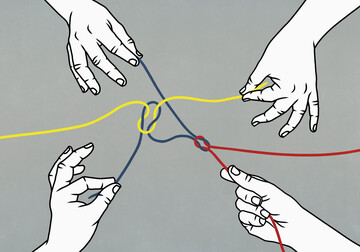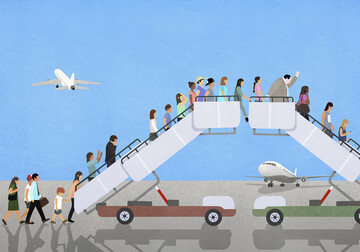
Flying and climate protection - is that even possible?
Boundless freedom above the clouds, the dream of flying, distant countries within easy reach, cultural interaction – air travel awakens many positive thoughts and enables important encounters. But it also has a darker side, for the environment and the climate. No means of transport is more harmful to the climate than flying because of the CO₂ emissions, but also because of the non-CO₂ effects such as cloud formation or nitrogen oxide emissions.
Steady growth – what comes after Covid-19?
Air travel has been going in only one direction in recent years: upwards. Between 2013 and 2018, global air travel increased by approx. five percent annually. It remains questionable whether the Covid-19 pandemic will herald a reversal of this trend. It did lead to a huge slump in passenger numbers, with only around 30 percent of planned flights taking off around the world in April 2020. In Germany and the EU, aviation came to an almost complete standstill in the spring of that year. Experts believe, however, that aviation will recover after the pandemic unless it is more strictly regulated and the development of sustainable technologies is intensified. Combined with the realization that many trips by plane are unnecessary, this is a good time and a good reason to re-think and re-direct the future of air transport.
Ways to protect the climate
Air travel will remain part of our lives even in a climate-neutral world. However, to limit its climate-damaging effects, it will have to undergo a profound transformation. In order to limit global warming as much as possible, all sectors including aviation must become climate-neutral in the long term.
There are various ways to achieve greater climate protection in aviation. It is the task of policymakers to regulate the sector more strongly and reduce subsidies. The aviation sector must invest in technical innovations and alternative drive systems. And there is also plenty of scope for change on the individual level – by flying less and giving more climate-friendly alternatives a real chance. Compensating flights, i.e. offsetting greenhouse gases by financing climate protection projects, can only be the last resort for climate protection in our view; it is not a long-term solution.
Better to stay grounded? Our donation-funded project
In our donation-funded project entitled “Above the clouds or staying grounded?”, Oeko-Institut has taken a careful look at air travel and analyzed the different ways of achieving greater climate protection in this field. Now we’re presenting the results of this work on this website. It is divided into the following sections:
We want to provide facts with this website and contribute to improving the information that’s available. This should help all readers to better assess the climate impact of their actions. At the same time, we are calling on policymakers to adopt a much more ambitious approach in this field. More climate protection is urgently needed in the aviation sector. We know that the effective instruments are. Let’s use them!





